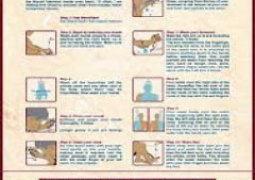It is preferred to invoke Allah’s blessings upon the Prophets and angels separately. As to others than the Prophets, there is consensus among scholars that Allah’s blessings may be invoked for them along with others (but not separately). The statement of the Prophet, peace be upon him, has been cited above, “O Allah invoke blessings on Muhammad, the Prophet, and his wives, the mothers of the believers ...” It is disliked, however, to invoke blessings for them on their own. For instance, one should not say, “Umar, may Allah shower His blessings upon him.”
How to Invoke Blessings and Peace Upon the Prophet
Abu Mas’ud Al-Ansari reported the following account from Bashir ibn Sa’d: “I asked Prophet, peace be upon him, ‘O Messenger of Allah, Allah has commanded us to invoke blessings upon you. How should we do it?’ The Messenger of Allah, peace be upon him, remained silent until we wished we had not asked him. Then he told us to say,
‘Allahumma salli ‘ala muhammadin wa ‘ala ali muhammadin kama sallayta ‘ala ali ibrahima wa barik ‘ala muhammadin wa ‘ala ali muhammadin kama barakta ‘ala ibrahima wa ‘ala ali ibrahima fil ‘alamin, innaka hammidum majeed’ (O Allah, bless Muhammad and the family of Muhammad as You blessed the family of Ibrahim, and give Baraka to Muhammad and the family of Muhammad as You gave Baraka to the family of Ibrahim, in all the worlds. You are worthy of Praise and Glorious), and then he told us to give the taslim as you have learned it.” (Muslim)
Abdullah ibn Mas’ud said, “When you invoke blessings upon the Prophet do it in the best manner, because you don’t know whether or not your blessings may be presented to him. The Companions asked him to teach them how to do it. He replied, ‘ Say, “Allahumma ‘ij’al salawataka wa rahmataka wa barakataka ‘ala sayyidil mursalin, wa imamal mutaqadimin wa khatimin nahiyyin muhammadin ‘abduka wa rasuluka imamal khair wa qaidil khair wa rasulir rahmati. Allahumma b’athu maqaman yaghbatuhu bihil awalun. Allahumma salli ‘ala muhammadin wa ‘ala ali muhammadin kama sallaita ‘ala ibrahima wa ali ibrahima innaka hamidum majeed . Allahumma barik ‘ala muhammadin wa ‘ala ali muhammadin kama barakta ‘ala ibrahima wa ‘ala ali ibrahima innak hamidum majeed (O Allah, shower Your blessings, mercy, and favors on the Chief of the Messengers, and the Chief of the Foremost, the Seal of the Prophets, Muhammad, Your servant and Your Messenger, the leader of the virtuous, the chief of the virtuous, the Messenger of Mercy, grant him a station that is the happy goal of the most excellent, O Allah, bless Muhammad and his family as You blessed Ibrahim and the family of Ibrahim. You are indeed Praiseworthy and Glorious. O Allah, give Baraka to Muhammad and his family as you gave baraka to Ibrahim and his family, You are indeed Praiseworthy and Going on a Journey
Abu Hurairah reported that the Prophet, peace be upon him, said, “Travel and be sound in health, and fight (in the cause of Allah) and be enriched.” (Ahmad. Almanawi considers this a sound hadith)
Leaving One’s House for What is Dear to Allah
Abu Hurairah reported that the Prophet, peace be upon him, said, “No one leaves his home without two banners waiting at his door, one of them in the hands of an angel and the other in the hands of a devil. If he intends to do what pleases Allah the angel will follow him with his standard, and he will remain under the banner of the angel until he returns to his house, but if he sets out for what displeases Allah the devil with his banner will follow him about, and he will remain under the devil’s banner until he returns to his house.” (Ahmad and At-Tabarani. Its chain of authorities is sound)
Consultation and Istikharah Before Setting out on a Journey
Istikhara (Arabic) means to ask Allah to guide one to the right thing concerning any affair in one’s life, especially when one has to choose between two permissible alternatives. A traveller should consult good righteous persons before setting out on a journey, because Allah says, “And consult them (O Prophet) in affairs (of moment),” (Qur’an 3.159) and one of the characteristics of the believers is that “they (conduct) their affairs by mutual consultation” (Qur’an 42.38). Qatadah said, “Every people who seek the pleasure of Allah and consult with one another are guided to the best course in their affairs.
“The traveller should also make istikharah and seek guidance from Allah. Sa’ d ibn Waqas reported that the Prophet, peace be upon him, said, “Istikharah (seeking guidance from Allah) is one of the distinct favors (of Allah) upon man, and a good fortune for the son of Adam is to be pleased with the judgment of Allah. And a misfortune of the son of Adam is his failure to make istikharah (seeking Allah’s guidance), and a misfortune for the son of Adam is his displeasure with the judgment of Allah.” Ibn Taimiyyah said, “He who seeks guidance from the Creator and consults the creatures will never regret it.”
How to make Istikharah
For this purpose one should pray two non-obligatory raka’at of prayer, even if they are of the regular Sunnah prayers or a prayer for entering the mosque, and so on, during any time of the day or night. One should recite in them whatever one wishes of the Qur’an, after reciting al-Fatihah. Then one should praise Allah and invoke blessings upon the Prophet, peace be upon him. After this one should supplicate to Allah with the following supplication, which Jabir Ibn ‘Abdullah has reported from the Prophet, peace be upon him, when he related, “The Prophet, peace be upon him, taught us how to make Istikharah in all (our) affairs, just as he taught us various surahs of the Qur’an. He told us, ‘If anyone of you considers doing something he should offer a two-rak’at prayer other than the obligatory prayers, and then say (after the prayer), “Allahumma inni astakhiruka bi’ilmika. wa astaqdiruka bi-qudratika, wa as’aluka min fadlika al-azimfa-innaka taqdiru wala aqdiru, wa ta’lamu wala a ‘ lamu, wa anta ‘allamu-lghuyub. Allahumma, in kunta ta’ lamu anna hazhaI-amra khairun lifi dini wa ma’ashi wa aqibati amri (or ‘ajili amri wa’ajilihi) f aqdirhu li wa yas-sirhu li thumma barik li fihi, wa in kunta ta’llamu anna hazha-l-amra sharrun lifi dini wa ma’ashi wa-aqibati amri (orfi’ajili amri wa ajilihi) fasrifhu anni wasrifni’anhu. Wa aqdir li al-khaira haithu kana thumma ardini bihi (O Allah! I ask guidance from Your knowledge, and Power from Your Might and I ask for Your great blessings. You are capable and I am not. You know and I do not and You know the unseen. O Allah! If You know that this thing is good for my din and my subsistence and for my Hereafter - (or say, If it is better for my present and later needs) - then ordain it for me and make it easy for me to obtain, and then bless me in it. If You know that this thing is harmful to me in my din and subsistence and in the Hereafter--(or say, If it is worse for my present and later needs)--then keep it away from me, and keep me away from it. And ordain for me whatever is good for me, and make me satisfied with it).”’ The Prophet, may peace be upon him, added that then the person should mention his need.” There is nothing authentic concerning anything specific that is to be recited in the prayer nor is there any authentic report concerning how many times one should repeat it.
An-Nawawi holds that “after making istikharah, a person must do what he is wholeheartedly inclined to do and feels good about doing and should not insist on doing what he had desired to do before making the istikharah. And if his feelings change, he should leave what he had intended to do, for otherwise he is not leaving the choice to Allah, and would not be honest in seeking aid from Allah’s power and knowledge. Sincerity in seeking Allah’s choice, means that one should completely abandon what one desired oneself.
To be continued




